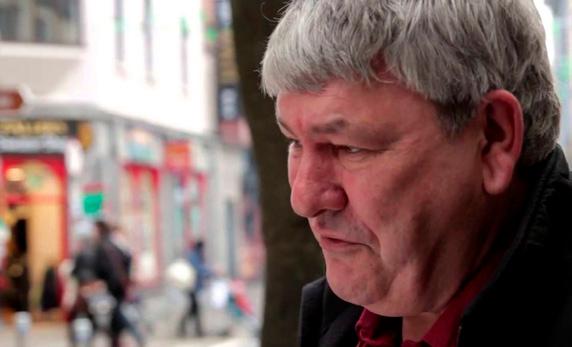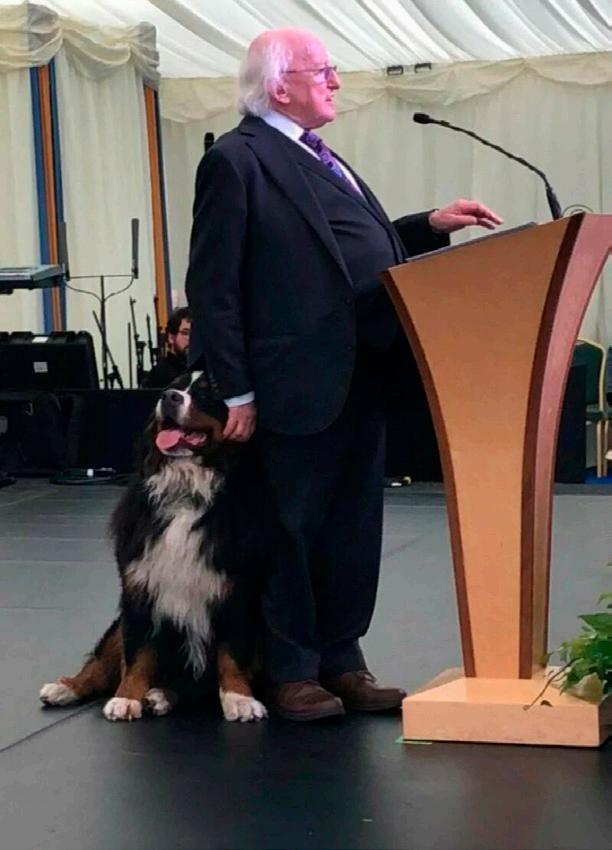
6 minute read
MOL NA MEÁIN: Pádraic Breathnach
Le Eímear Nig Oireachtaigh
Is é seo colún nua Gaeilge ag SIN- ina phléann Eímear Nig Oireachtaigh daoine a bhíonn ag obair sna meáin, agus an bheart atá déanta acu maidir leis an teanga.
Advertisement
Tá seans maith ann go bhfuil a i t h n e a g a t a r P h á d ra i c Breathnach mar gheall ar a ról mar ‘Jacksie’ – an tábhairneoir i Killinaskully. Ach tá go leor déanta aige seachas sin – bhunaigh sé ‘Macnas,’ grúpa mór aisteoireachta i nGaillimh mar shampla. Bhí deis agam labhairt leis, agus bhí a lán le rá aige. Thosaigh mé amach le ceist chonspóideach – “Conas a spreagann tú an Ghaeilge i do shaol féin?”
Tá cáil ar Pháraic as a mhacántacht, agus ba léir é sin dom as a fhreagra díreach: “Ní cheapaim go bhfuil aon dualgais orm an Ghaeilge a spreagadh.” Lean sé ar aghaidh ag míniú go bhfuil go leor duine ag cur béime ar spreagadh an teanga, ar fhoghlaimeoirí an teanga, ar ghach rud seachas í a labhairt. Ní aontaím go hiomláin leis - tá mé ag iarraidh an dá thrá a fhreastal, idir spreagadh an teanga agus í a labhairt. Is dócha go dtaispeánann sé sin mo phearsantacht féin níos mó ná aon rud eile. Tá mé i gcónaí ag iarraidh go mbeidh gach duine sásta!
Maidir leis an teanga ina shaol féin, úsáideann sé ina shaol pearsanta go minic í, ach “is fíorannamh” ina úsáideann sé an Ghaeilge ina shaol proifisiúnta. Agus cén fáth?
“Níl mórán daoine i m’earnáil ag obair ina bhfuil Gaeilge acu.” Bhí ionadh orm é sin a chloisteáil, ach is dócha go bhfuil mo bholgán féin agam ina bhfuil go leor Gaeilge ann, agus i ndáiríre, ní hé sin an saol do go leor daoine. Ach ansin chuala mé abairt nach raibh mé ag súil leis: uaireanta fiú nuair a bhíonn tú ag aisteoireacht i scannán Gaeilge, is é an Béarla a labhraítear ar chúl stáitse.
An féidir leat sin a chloisteáil? Sin an idéalú a bhí agam den earnáil Gaeilge sna hEalaíona i smidiríní.
Ar ndóigh, ba bhreá le Pádraic níos mó obair a dhéanamh as Gaeilge, ach bhí fadhbanna eile aige maidir leis a chanúint. Dar leis féin, níl sé ar a chompord riamh agus é ag labhairt as Gaeilge, go dtí go mbíonn sé siar abhaile lena siblíní - “Tá sé deacair nuair a airíonn tú nach bhfuil tú in ann a bheith oscailte, nuair nach bhfuil aon saoirse cainte agat.” Níor smaoinigh mé air sin riamh, mar bhean as Cill Mhantáin, le blas Baile Átha Cliath Theas orm. Láithreach, bhí náire orm faoi gach uair a chuir mé ceist ar chainteoir dúchais rud éigin a athrá. Ach ní hé sin an sprioc a bhí aige, bhí sé díreach ag labhairt go macánta.
Ní raibh ach ceist amháin fágtha agam – agus is breá liomsa rudaí a chríochnú ar fhocal dearfach- “Céard é an rud is fearr leat faoin nGaeilge?” “An spraoi,” a deir sé. “Is é an chlisteacht teanga a thaitníonn liom is mó, agus an chaoi gur féidir leat rudaí a rá go leataobhach.”
Caithfidh mé a rá, is é sin ceann de na rudaí is fearr liomsa freisin. Is féidir leat rudaí a rá as Gaeilge, agus nuair a deir tú an rud céanna as Béarla, níl an cuma chéanna air.
Bhí comhrá iontach agam le Páraic, agus tá go leor saothair aige atá le moladh. Bhí ról aige sa scannán Michael Collins, ach má tá tú ag iarraidh é a fheiceáil ag aisteoireacht as Gaeilge, molaim an gearrscannán ‘An Leabhar’ – pléann an scannán dúnmharú i bPáras agus tá na póilíní ansin agus na Gardaí i nGaillimh ag obair le chéile chun an duine a ghabháil.
DOG DAYS — Pet support in Quarantine
By Katie Barragry
For many of us lockdown was quite literally like being in the doghouse. We were confined to a small space, our movements were restricted and ultimately, we didn’t understand how we had ended up there.
It was as if we had been punished and were frankly, quite miserable about it. Quarantine was undoubtedly a difficult time for everyone, and it is no secret that our lives have changed drastically in the last few months. Along with the constant anxiety of a pandemic, working from home, a lack of socialisation and nowhere to go took its toll on us. There was little escape and little to look forward to.
However, despite the often-monotonous days of confinement, many people will concur that their pets cheered them up during lockdown. Along with banana bread, home haircuts and YouTube workouts, that is.

We recently heard of the sad passing of President Michael D. Higgins’ dog Síoda. People offered their sincerest condolences to the Higgins family which is a testament to how the President’s dog had become a modern symbol of our country in recent years. There is something beautiful and unique about Ireland and its people as tributes began to pour in nationwide for the beloved canine. A mural has even been erected in Ringsend, Dublin of the Bernese Mountain Dog, entitled “Naomh Síoda Madra na hÉireann.”
A street artist known as High King Jack painted the mural of Síoda, depicting her as a saint. The witty caption that accompanied the artist’s photo on Instagram perfectly captures how many Irish people felt about the President’s adored dog, “In honour of an absolute unit in the world of Irish diplomacy; Michael D’s late dog…rest easy.”
For many, losing a pet is up there with the hardest things that life will throw at you. Many of us grew up with a family dog; someone you played with all day and someone you secretly fed scraps to off the kitchen table. For others, it was a cat that would purr in your arms until you both fell asleep, or a rabbit that you would buy fresh carrots especially for. Many of us had a fish or two that required little maintenance but were important family members all the same.
What these pets have in common is companionship. Although, they can’t speak, they’re here for us. They interact with us. They entertain us. They distract us from our daily worries.
During lockdown, many of us felt increasing levels of panic and stress in our everyday lives. Our dogs and cats in particular played a calming role. Pets reduce our stress levels. They distract us and put our minds at ease. Be it going for a walk outside or lying on the couch together, their company just relaxes us.
When I’m home alone, I like the security of knowing my two dogs are in the house with me. They are big friendly giants but will bark and howl when needed. Pets reduce loneliness and feelings of isolation. They keep us company. Many domestic animals served as a vital lifeline for people during lockdown. They give us something to focus on and to care for, while comforting us in return.
Having a pet at home is a bond like no other. Our furry friends really showed their value, companionship, and loyalty during national quarantine. Unfortunately, we have recently seen rising reports in the number of pets, particularly dogs being stolen from households. What would possess someone to take a family member away from their loved ones is beyond me. Please mind your pets, keep them safe and ensure they are protected when you’re not at home where possible.
There’s a beautiful quote from Marley and Me that sums up the value that dogs and pets in general have in our lives, “A dog has no use for fancy cars, big homes, or designer clothes. A water-log stick will do just fine. A dog doesn’t care if you’re rich or poor, clever or dull, smart or dumb. Give him your heart and he’ll give you his. How many people can you say that about? How many people can make you feel rare and pure and special? How many people can make you feel extraordinary?”
Pets really are invaluable, so take care of them and they’ll take care of you.







